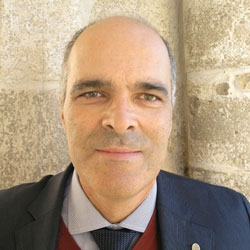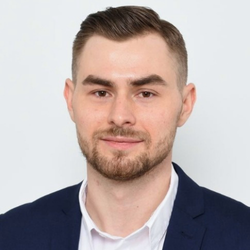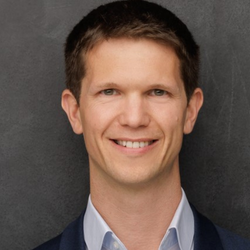Check here some more information on this BIP speakers and what they’ll talk about.
Alexandra Costa
ISEL
Patrícia Barata
ISEL
Introduction to Green Engineering
Abstract. Green Engineering focuses on developing sustainable technologies and processes that minimize environmental impact while maximizing efficiency and resource conservation. Guided by the Principles of Green Engineering, such as waste prevention, renewable material, energy efficiency, and inherent safety, this field plays a crucial role in advancing eco-friendly innovations. One emerging area is the development of sustainable nanomaterials with exceptional optical, electrical, and catalytic properties, with applications in areas such as biomedical, catalysis, and energy storage, contributing to more sustainable industrial and medical advancements. .
Alexandra I. Costa received her Ph.D. in Chemistry (IST/UTL). She is an Adjunct Professor in the Chemical Engineering Department, an integrated member of the Chemistry Center - Vila Real (UTAD), President of the Center for Chemical Engineering Studies, Head of Organic Laboratory and pHarmaLab Laboratory.
Her main research activities are focused on Supramolecular Chemistry, particularly the synthesis of sensors containing calixarenes, and is also dedicated to the use of renewable natural resources for the sustainable synthesis of carbon nanomaterials and their application as sensors for biological materials and as bioimaging tools. She is co-author of several scientific articles, published in international journals with referee, conference proceedings, patents, and presented her findings in scientific meetings.
Patrícia D. Barata holds a Ph.D. in Sustainable Chemistry and an M.Sc. in Technological Organic Chemistry (FCT/UNL), along with a degree in Industrial Chemical Engineering (ISEL). She is an Adjunct Professor in the Chemical Engineering Department, an integrated member of the Chemistry Center - Vila Real (UTAD), member of the Coordinating Council for the Orthoprosthetics Degree Program, Vice-President of the Center for Chemical Engineering Studies, and an assessor to ISEL's board on Sustainability. Her research focuses on Supramolecular Chemistry, particularly on calixarene-based sensors, and the development of carbon nanomaterials from renewable resources for biosensing and bioimaging. She is co-author of several peer-reviewed scientific articles and conference proceedings, with various presentations in scientific meetings.
Ann Creemers
UCLL
Green Chemistry
Abstract. This lecture will introduce the fundamentals of Green Chemistry and its 12 guiding principles. The goal is to highlight the role of Green Chemistry in promoting sustainable engineering practices. We will delve into key strategies of Green Chemistry, illustrated by examples from the chemical industry, such as the design of safer chemicals, the use of renewable feedstocks, the application of artificial intelligence in chemical engineering, and biomimicry.
Ann Creemers is a Chemical Engineer with a specialization in Chemical process technology, graduated from the Catholic University of Leuven (Belgium).
Ann has been teaching at UC Leuven-Limburg (UCLL) for over 15 years, where she is responsible for courses in applied physics, chemical engineering and organic chemistry. Throughout her career, she has actively participated in numerous projects focused on process intensification in collaboration with the chemical industry. These projects primarily aim to enhance resource and energy efficiency and recovery.
Aurore Olivier
HELHa University
Advanced Composites and Innovative Materials
Abstract. Controlled surface modification is a very attractive strategy to tailor the chemical and physical properties of a substrate such as UV stability, biocompatibility, wettability, and corrosion resistance. Using a spontaneous organic assembly of small molecules on surface offers a convenient way to modify the intrinsic properties of the surface. However, the lack of mechanical and chemical stability due the very limited thickness of the coating opened the way to a new category of coating such as the polymer brushes. This class of materials is characterized by an assembly of polymer chains tethered by one of their extremities to a surface by a chemical bond. A description of the main strategies to functionalize the surface with polymer brushes will be developed in this lesson.
Aurore Olivier obtained a Ph.D. from the university of Mons (Belgium) in 2010 for her research in materials science and more precisely in surface-grafting polymer brushes. This was followed by a post-doctoral position where she worked on a European research program in the field of biosensors.
From 2012 to 2019, she was employed in pharmaceutical industry to strengthen laboratory quality management. Since few years, she worked as professor in the “Haute Ecole Louvain en Hainaut (HELHa)” in the department of Sciences and Technologies.
Céline Fraipoint
He2b
Cristina Borges
ISEL
Introduction to Sustainable Materials. Characteristics and types of sustainable materials
Abstract. After a brief description of what resources are and the distinction between renewable and exhaustible resources, the course will focus on environmental and societal impacts that the production, use and waste of metallic, polymer and/or ceramic materials generate. This will allow us to have a critical look at sustainable materials depending on the uses.
Céline Fraipoint is a Civil Engineer with a specialization in Material Science (Electromechanics), who graduated from the University of Liege (Belgium). She has been teaching Material Science in HE2B for more than 15 years. She tries to awaken the students to an environmental reflection in her courses through aspects such as life cycle of materials, production and recycling aspects... Beyond her teacher role, she is also pedagogical coordinator of the engineering curricula, quality coordinator and is active in the success support service for students.
Cristina Borges has PhD in Chemical Engineering – Instituto Superior Técnico; Graduated in Chemistry – Faculdade de Ciências da Universidade de Lisboa. She is Adjunct Professor since 2002 in ISEL, lecturing Chemistry, Sustainability and Renewable Energies. She has authored or co-authored several publications in conference proceedings, journals, and book chapters, mainly in materials chemistry, sustainable materials and engineering education area. Also, she has been researcher in research projects in sustainable materials area and engineering education. She was ISEL's vice-president for academic affairs and quality between 2020 and 2024 having developed projects in the context of academic success and soft skills. Cristina Borges is a member of Engineering Education Portuguese Society, having coordination activities in the field of Gender and Diversity in Engineering Education.
Isabel João
ISEL
Circular Product Design
Abstract. Decisions made early in product design significantly influence how products are used and handled at the end of their lifecycle. With the urgent need to shift from the linear “take, make, dispose” model, circular economy principles must guide new product development. Designers play a key role in this transition, re-framing products with circularity in mind to meet societal, user, and business needs. This session explores product design for the circular economy, focusing on design processes and strategies such as creating long-life products, extending product life, designing for material and energy sustainability, recycling, and remanufacturing. By the end, students will understand the role of design in fostering circularity and the main strategies involved.
Isabel João is a Chemical Engineer and holds a Master’s degree in Materials and Quality Management and a PhD in Industrial Engineering and Management. She is Professor at the Chemical Engineering Department at ISEL-IPL, Portugal and currently the coordinator of the Quality and Environmental Engineering Master Course at ISEL-IPL. She is a Researcher at CEG-IST, Portugal, Committee Member of the CT 150 /SC4 Environmental Management/Environmental Performance Evaluation within the Portuguese Environmental Agency and Expert Academic of the Consumer Policy Advisory Group (CPAG) of the European Commission (EC). She teaches and does research in the areas of Sustainable Product and Process Design, Entrepreneurship, Decision Analysis for Sustainability, Operations Management, and Quality Engineering.
Filipe Barata
ISEL
Energy Efficiency for a Sustainable Future
This talk explores energy efficiency in buildings, industry, and European appliance energy labelling as a comprehensive framework for systematically analysing and minimizing energy consumption. Key areas of focus include major energy-consuming equipment in buildings and industrial processes, such as HVAC systems, lighting, motors, and others. The analysis examines strategies to reduce energy demand, such as implementing advanced technologies, optimizing operations, and leveraging renewable energy sources. The role of the European appliance energy labelling system is also highlighted by showing some requirements examples for different equipment’s, emphasizing its impact on promoting energy-efficient choices among consumers. The aim is to provide actionable insights into reducing energy consumption while aligning with European sustainability and climate objectives.
Filipe Barata is Professor at Instituto Superior de Engenharia de Lisboa (ISEL). He held a PhD in Electrical Engineering and Computers and a Postgraduate degree in Energy Management - Energy Efficiency and Post-Graduation in Electrotechnical Engineering. He was project manager in a consulting and auditing engineering company where he carried out dozens of audits and energy certifications in buildings and facilities. In the electrical engineering department, he teaches and he is responsible for the electrical installations design and energy efficiency disciplinary group and also for the Pos Graduate in Design and Maintenance of Electrical Installations. He has several publications in journals, books chapters and conferences proceedings in renewable energies, intelligent control systems, energy efficiency and smart grids areas.
He is a reviewer of different International Journals (Elsevier, MDPI) and Reviewer Board Member of Energies Journal (Open Access by MDPI).
João Silva
ISEL
Life cycle assessment
Abstract. Life Cycle Assessment (LCA) is a methodological framework for evaluating the environmental impacts associated with all the stages of a product's life, from raw material extraction through manufacturing, use, and disposal. LCA helps in understanding the environmental impacts of a product or service, including energy consumption, emissions, and waste generation, across its entire life cycle. This session will show to students the basic modelling steps in openLCA using an example of plastic bottles for packaged drinking water.
João Silva is a Chemical Engineer and holds a PhD in Chemical Engineering. He is a Coordinator Professor at the Chemical Engineering Department at ISEL-IPL, Portugal. He is a Researcher at ZeolCat CQE IMS, Portugal. His research activity is in the areas of heterogeneous catalysis, development of pilot equipment, study of models for process control and process simulation. He is co-author of more than seventy articles in scientific journals, sixteen book chapters, more than one hundred conference publications and three patents. He teaches in the areas of Sustainable Product and Process Design and Process simulation.
Marco Berger
Tugraz University
Volker Koch
Tugraz University
Business Model for Circular Economy
Abstract. This talk explores the Business Model Canvas as an effective framework for visually and systematically organizing business models. Key elements such as customer segments, value propositions, revenue streams, and key resources are examined in detail, highlighting their interconnections. The aim is to provide a clear understanding of how to create a business model that aligns with circular economy objectives.
Development of a Business Model
Abstract. Based on the talk Business Model for Circular Economy students will develop a business model for a case study with guidance from the lecturers. This hands-on approach enables students to apply theoretical concepts to real-world scenarios.
Marco Berger is a researcher and lecturer at the Institute of Business Economics and Industrial Sociology at Graz University of Technology (TU Graz). His research focuses on business-to-business sales management, and he teaches various courses in business economics.
Volker Koch, Ph.D. is a Senior Lecturer of the Institute of Business Economics and Industrial Sociology at Graz University of Technology (TU Graz). His current research interests are in the field of “Engineering Education”. Besides, he teaches several lectures and exercises in the field of Business Economics and social skills.
Rita Pereira
ISEL
How to communicate and present my work
Abstract. This activity focuses on equipping students with the skills and knowledge required for an effective final presentation. The session will cover best practices and norms for delivering oral presentations using PowerPoint, emphasizing clarity, structure, and impactful communication. Additionally, students will receive targeted feedback on their previous presentations, identifying areas for improvement and strategies to enhance their performance. This activity aims to support students in presenting their sustainable engineering projects with confidence, professionalism, and adherence to standards of academic and technical communication.
Rita Pereira has PhD in Mechatronics and Energy Engineering – Évora University; Excellency in Problem Based Learning by UNESCO CHAIR; MSc. in Electrical and Computer Engineering – Instituto Superior Técnico; Graduated and Bsc. in Electrical Engineering – Instituto Superior de Engenharia de Lisboa. She is Adjunct Professor since 2015 in ISEL, lecturing Electrical Machines, Intelligent Systems and Energy Storage Systems. She has authored or co-authored several publications in conference proceedings, journals, and book chapters, mainly in smart grids and engineering education area. Also, she has been researcher of about a dozen research projects in electrical engineering area and engineering education. Rita Pereira is a member of Portuguese Engineers Order and Engineering Education Portuguese Society, having coordination activities in the field of Gender and Diversity in Engineering Education.













